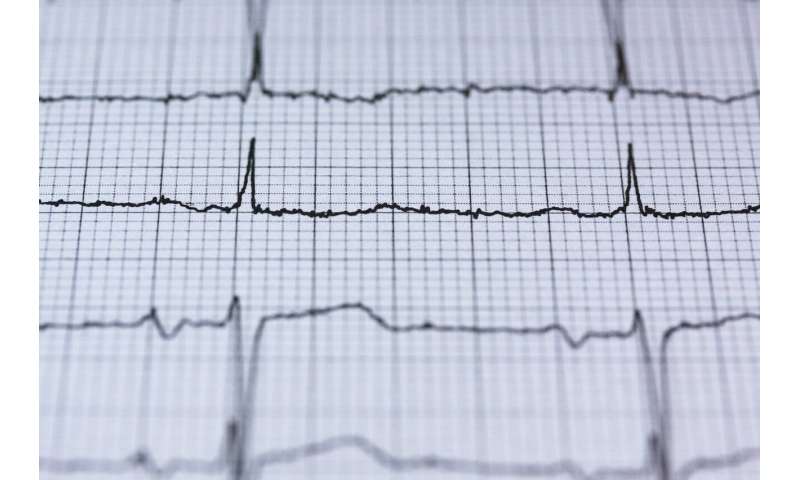
Health care professionals should become more familiar with medications that cause irregular heart rhythms called arrhythmias, according to “Drug- Induced Arrhythmias,” a new scientific statement from the American Heart Association, published today in the Association’s flagship journal Circulation.
“Many commonly used medications can cause irregular heartbeats as a side effect,” said James E. Tisdale, Pharm.D., FAHA, professor of pharmacy practice at the College of Pharmacy at Purdue University, adjunct professor at the School of Medicine at Indiana University and chair of the writing committee for the American Heart Association’s scientific statement. “While the risk is relatively low, it is important for health care professionals to consider that their patient’s arrhythmia could be caused or worsened by a medication.”
During an arrhythmia, the heart can beat too fast, too slowly or with an irregular rhythm. Arrhythmias can be caused by genetics or numerous conditions, including coronary artery disease, thyroid problems or electrolyte imbalances. This statement reviewed medications that can cause or exacerbate arrhythmias, risk factors for these side effects and prevention, monitoring and treatment options for people who are at risk for or develop arrhythmias.
While the statement was written for health care professionals, patients should know to continue to take their medications as directed and talk with their health care professional about any concerns with their medicines and any risk factors for a medication-induced arrhythmia.
There are several different types of drug-induced arrhythmias. Some medications can cause slower heart rates, and others can cause rapid heart rhythms from the upper chambers (atria) or lower chambers (ventricles) of the heart. When a heart beats too fast, the condition is called tachycardia. When a heart beats too slowly, the condition is called bradycardia. Often there are no symptoms, but some people feel their heart “racing” or “fluttering” or have trouble breathing, faint or become dizzy. If an arrhythmia is left untreated, the heart may not be able to pump enough blood to the body, which can damage the heart, the brain or other organs, and possibly cause the person to faint. Some arrhythmias are life-threatening and require immediate treatment.
Heart rhythm side effects during the COVID-19 pandemic
During the COVID-19 pandemic, chloroquine, hydroxychloroquine and azithromycin have been used to manage the novel coronavirus disease, noted the writing group. These medications can cause heart rhythm disturbances, and there have been some clinical trials to assess their effectiveness to treat COVID-19, including one National Institutes of Health trial that was halted in June. In June and July, the U.S. Food and Drug Administration revoked emergency use and issued a warning against the use of hydroxychloroquine or chloroquine for the treatment of COVID-19 outside of a clinical trial or hospital.
Heart rhythm disorders have been reported as a side effect of hydroxychloroquine alone and in combination with azithromycin among patients with COVID-19. Other medications proposed for managing COVID-19 such as lopinavir/ritonavir also have the potential to interfere with the heart’s normal rhythm. Guidance from the American Heart Association for managing arrhythmia risk associated with these medications in patients with COVID-19 was issued earlier this year: Considerations for Drug Interactions on QTc in Exploratory COVID-19 Treatment.
Who’s at risk?
People with a history of heart attack, heart disease or previous heart surgery are more likely to develop an irregular heartbeat after exposure to certain medications. Other risk factors for medication-induced arrhythmias include older age, deficiencies of potassium or magnesium, and excessive drinking. Some patients who experience drug-induced arrhythmia may have a genetic predisposition. The most common test used to diagnose an arrhythmia is an electrocardiogram (ECG).
Prevention and monitoring
Taking medications as directed and maintaining normal electrolyte levels, kidney and liver function can help reduce risk. Other strategies for prevention include using the lowest effective dose of arrhythmia-inducing medications, minimizing or avoiding the use of stimulants and avoiding excessive alcohol intake (women: 1 or fewer drinks per day; men: 2 or fewer drinks per day). Understanding and avoiding medication interactions can also help minimize risk.
For certain high-risk medications, patients may need to be hospitalized using a heart monitor while starting the medication. For patients at increased risk of a drug-induced arrhythmia, regular ECG monitoring may also be performed.
Treatment
Treatment usually includes discontinuing the medicine that is causing the arrhythmia, and may also include antiarrhythmic medicines, or placement of a device that can correct an irregular heartbeat. “Medications are extremely important and beneficial for treating a large variety of diseases and chronic health conditions, and patients should not change or stop taking any of their medicines without talking with their health care professional,” said Tisdale.
Source: Read Full Article
